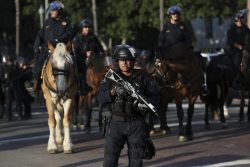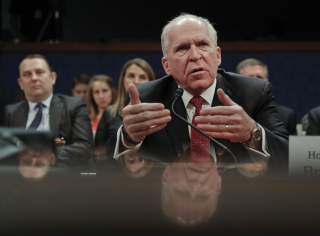





By: Ana Kasparian
July 10, 2025

By: Paul Sperry
July 8, 2025

By: Vince Bielski
July 2, 2025

By: James Varney
June 30, 2025







EXCLUSIVE: The Obama administration “manufactured and politicized intelligence" to create the narrative that Russia was attempting to... Read More
Immigrants who arrive illegally in the U.S. may be detained for months or years as they await a resolution to their immigration cases. Read More
Out of the hundreds of grants the National Science Foundation (NSF) has canceled this year under the Trump administration, the vast majority... Read More
Survivors of the Al-Baqa Cafe bombing in Gaza, and the loved ones of the dead, share their stories of the Israeli attack. Read More
Topline: Even Secret Service agents need to use the bathroom, and that includes when they are protecting President Donald Trump during his... Read More

By: Ana Kasparian
July 10, 2025

By: Paul Sperry
July 8, 2025

By: Vince Bielski
July 2, 2025

By: James Varney
June 30, 2025

By Nancy Rommelmann, RealClearInvestigationsApril 10, 2025 Joe Ziegler is not a beaten man – not for his antagonists’ lack of trying.... Read More
MAGA-friendly media has been torn on how to respond to a base wanting more on the Epstein files and a president who wants them to move on. Read More
By Paul D. Thacker, RealClearInvestigationsMarch 4, 2025 Jay Bhattacharya was in pretty terrible shape five years ago. He was losing sleep... Read More
A monthslong investigation by CBS News punctures Thomas Crooks’ secrecy to reveal the broadest portrait yet of the lonesome young student... Read More
Lee Saunders and Randi Weingarten say party not standing up for working people amid ‘existential battle’ under Trump Read More
Against fierce resistance, the Trump administration is enlisting the Internal Revenue Service and Social Security Administration in its... Read More

When the Biden administration announced $27 billion in environmental grants last April, it set the clock ticking on a predicament: how to get... Read More
Fresh off its decision to claw back $20 billion in “greenhouse gas reduction” money the Biden Environmental Protection Agency parked at... Read More
By Bob Ivry and Jeremy Portnoy, RealClearInvestigationsMarch 25, 2025 In 1974, Congress created the Legal Services Corporation to connect... Read More
By Bob Ivry and Jeremy Portnoy, RealClearInvestigationsMarch 3, 2025 To crack down on Pentagon spending, the Defense Department adopted a... Read More
As Elon Musk and his tech team urge their fellow Americans to become “domestic auditors” to help rein in federal spending, people have... Read More
Like the weather, everyone complains about Pentagon spending and mismanagement, but no one does anything about it. Leaders of the world’s... Read More
By her own admission, Stacey Abrams has made a number of Read More
The DNC’s litigation unit is now run by a recently departed DOJ attorney who began working during the Obama administration. Read More
This article contains graphic descriptions that may not be suitable for all readers. Parental discretion is advised. RALEIGH, N.C. – Like... Read More
By John Murawski, RealClearInvestigationsMay 7, 2025 AUSTIN, Texas — Lacking three crucial components – students, faculty, and facilities... Read More
While limiting strings-attached grants and curbing federal regulation, President Trump’s efforts to dismantle the Department of Education... Read More
Men aren’t the only ones susceptible to extremist thinking. Read More
As the policy director for the Classic Learning Test (CLT), I’ve had dozens of conversations with lawmakers across the country about... Read More
Some students think the world is ending. The mental health industry told them so. Read More
A radical student group at Brandeis University. Members of a socialist organization affiliated with House "Squad" members. The treasurer of a... Read More

By Vince Bielski, RealClearInvestigationsApril 22, 2025 GEO Prep Mid-City Academy, located in one of the poorest sections of Louisiana, did... Read More
California’s wide range of problems – including declining schools, widening inequality, rising housing prices, and a weak job market –... Read More
By Ana Kasparian, RealClearInvestigationsMarch 19, 2025 VENICE, Calif. – Francesca Padilla was awakened by the sound of screaming people... Read More
California Gov. Gavin Newsom doesn’t typically get involved in disputes between rival Native American tribes. That changed last year, when... Read More
By Ana Kasparian, RealClearInvestigationsMay 1, 2025 Smiley Martin should have been behind bars. A career criminal with a long rap sheet... Read More
“The customers cited the general uncleanliness of the street scene, visibility of individuals engaging in drug use, and unhoused... Read More
Taxpayers have forked over nearly $2 billion for the project via the 2022 Inflation Reduction Act. Read More
Worried about the environment and the loss of skills, some people are resisting the rise of AI. Read More
How luxury cars, $500,000 bar tabs and a mysterious kidnapping attempt helped investigators unravel the heist of a lifetime. Read More

They jet in on business class, with designer handbags slung over their shoulders, headed not for a vacation, but to a luxury apartment to... Read More
A new CIA review faults top Obama intelligence officials for "procedural anomalies", while ignoring the core deceit in their allegations of... Read More
The DIA relied heavily on Iranian assessments already known to be untrustworthy, current and former intelligence officers told the Free Beacon Read More

This is the second of a two-part series on the global housing crisis. Read the first installment here. The affordable housing crisis in... Read More
Part 1: How the AI Fuse Was LitPart 2: One Year of ChatGPT Read More
Ukraine’s counteroffensive has failed to deliver its expected punch and secure a decisive breakthrough, generating friction between... Read More
“Deadly Fake” is a special project from The Dallas Morning News that chronicles the impact of fentanyl on North Texas across 30 days in... Read More
Third in the Georgia Prison Corruption series: An Atlanta Journal-Constitution investigation has found that the state’s failure to employ... Read More
Agriculture feeds 8 billion people every day, but also threatens wild animals and plants because of the resources needed to raise our food,... Read More

Cellphone bans in schools are all the rage. Recently, New York became the fourth state to embark on one, as part of a budget deal for the... Read More
By Vince Bielski, RealClearInvestigationsJune 22, 2023 A growing number of states are adopting a comprehensive new type of school choice... Read More
Michael Bell, set to be executed Tuesday, is among at least 34 boys from the Dozier School later sentenced to death. Did abuse make them more... Read More
For too long, policymakers and businesses have made decisions on the belief that costs don’t matter. Reality is reasserting itself. Read More